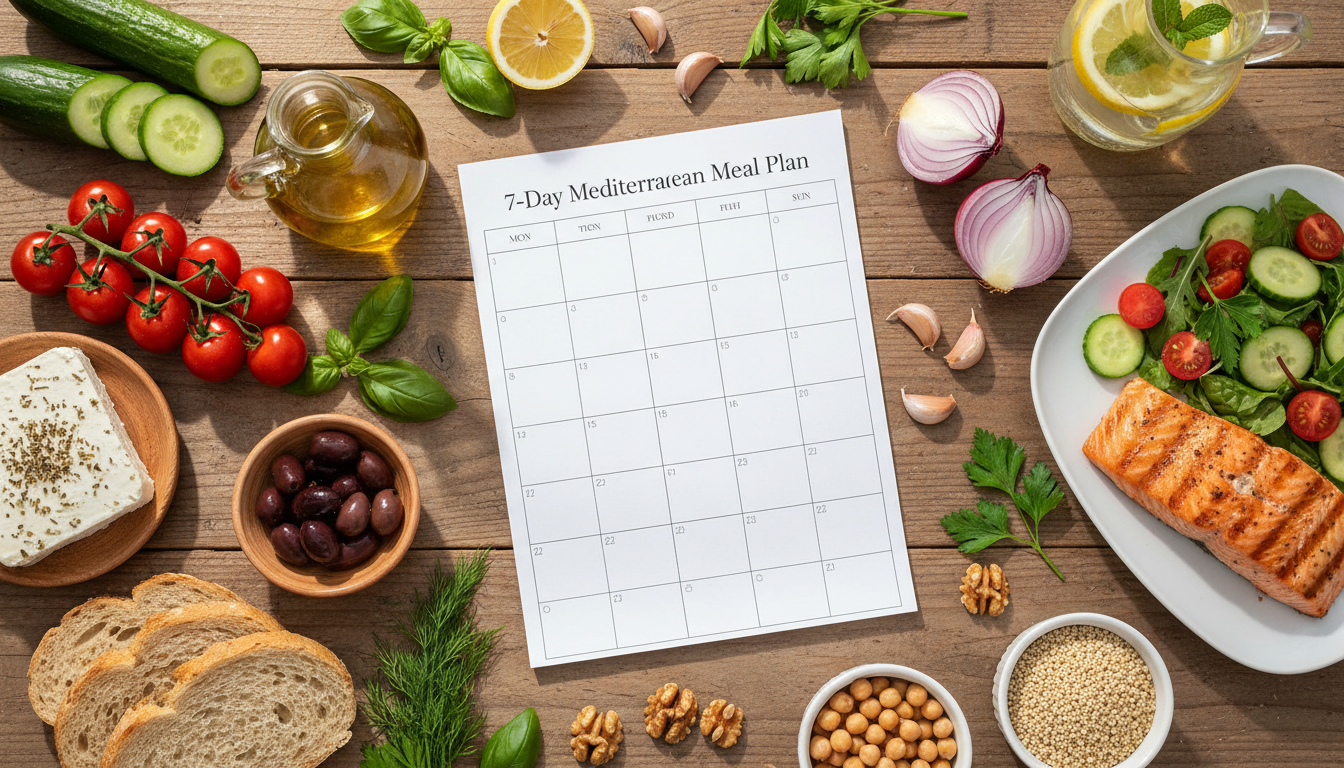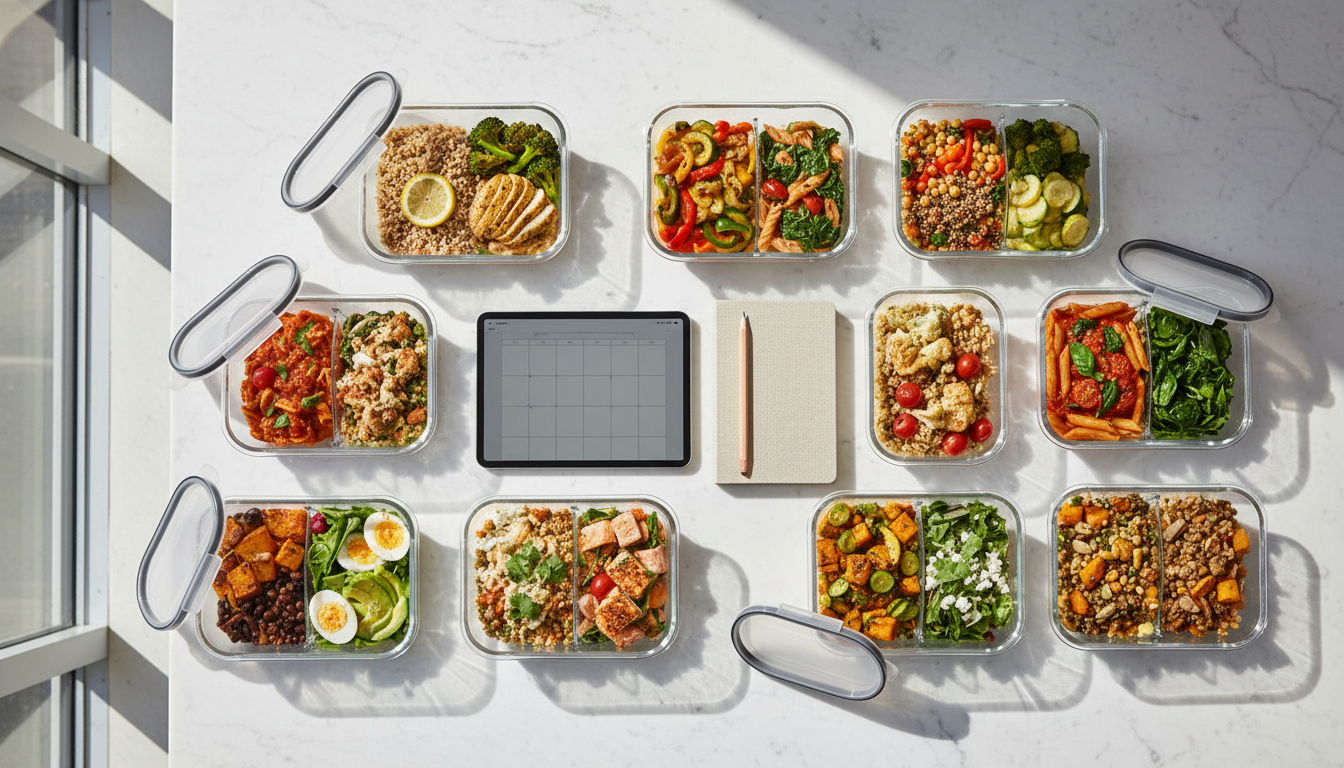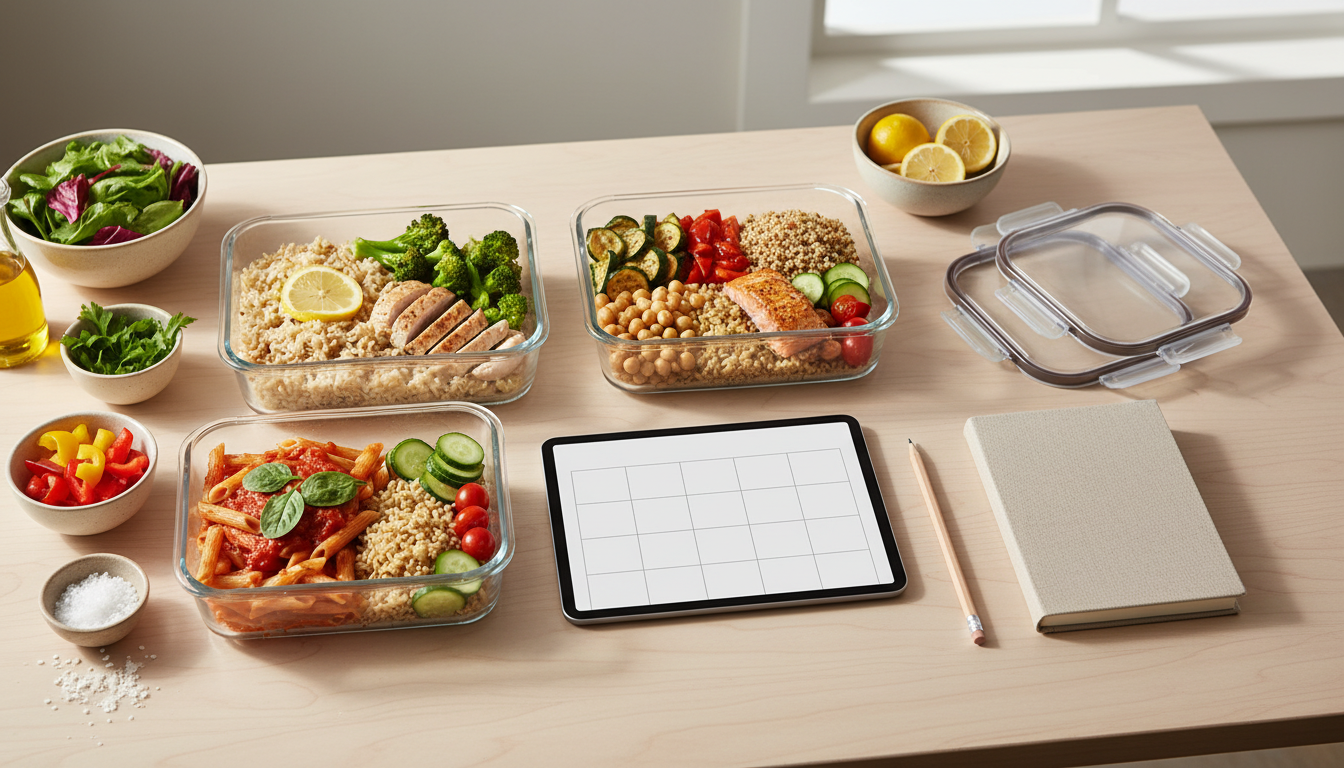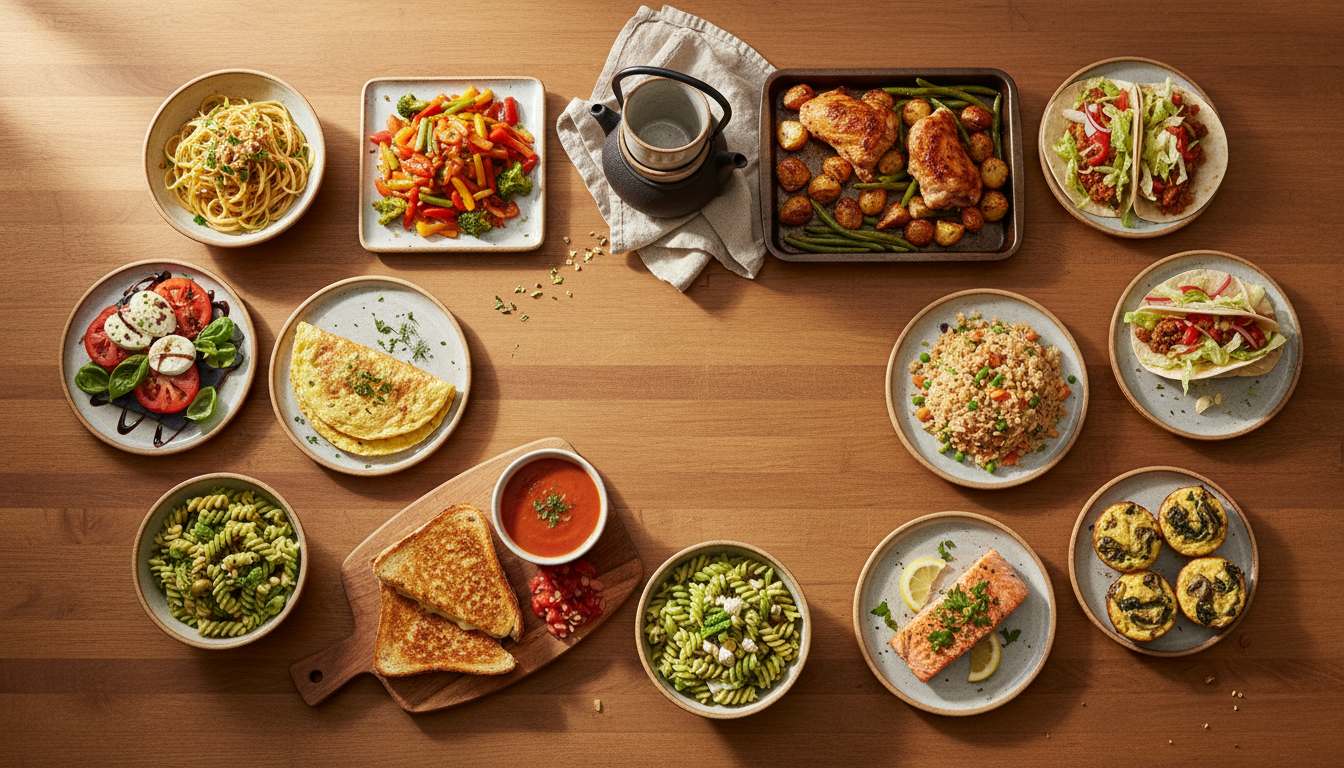Mediterranean Diet Meal Planning Guide: 7-Day Plan for Beginners

Starting a Mediterranean diet can feel overwhelming without a clear roadmap. This mediterranean diet meal planning guide provides a structured 7-day framework that removes the guesswork and helps you build sustainable healthy eating habits from day one.
Research shows that meal planning reduces decision fatigue and increases adherence to dietary changes by up to 60%. With this comprehensive guide, you'll discover how to transition smoothly to Mediterranean eating while enjoying delicious, nutrient-rich meals that support long-term health.
What is the Mediterranean Diet?
The Mediterranean diet isn't just another restrictive eating plan—it's a lifestyle approach inspired by the traditional eating patterns of countries bordering the Mediterranean Sea, including Greece, Italy, and Spain.
Core Principles of Mediterranean Eating
The foundation of this mediterranean diet meal planning guide centers on several key principles:
Primary food sources include:
Fresh vegetables and fruits (7-10 servings daily)
Whole grains like quinoa, farro, and brown rice
Legumes, nuts, and seeds as protein staples
Extra virgin olive oil as the primary fat source
Fish and seafood (at least twice weekly)
Moderate amounts of poultry, eggs, and dairy
Limited red meat (only a few times per month)
Beyond food choices, Mediterranean eating emphasizes:
Shared meals with family and friends
Physical activity as a daily practice
Mindful eating and savoring flavors
Using herbs and spices instead of excess salt
Health Benefits Backed by Research
The Mediterranean diet stands out as one of the most extensively researched eating patterns in nutritional science.
Cardiovascular health: A landmark study published in the New England Journal of Medicine found that following a Mediterranean diet reduced the risk of heart disease by approximately 30% compared to a low-fat diet.
Brain function: Research from the Journal of Alzheimer's Disease indicates that adherence to Mediterranean eating patterns may slow cognitive decline and reduce dementia risk by up to 40%.
Additional evidence-based benefits include:
Improved blood sugar control and reduced diabetes risk
Better weight management without calorie counting
Reduced inflammation throughout the body
Lower rates of certain cancers
Enhanced longevity and quality of life
These benefits emerge not from a single "superfood" but from the synergistic effect of whole, minimally processed foods consumed consistently over time.
Essential Components of Mediterranean Meal Planning
Success with any mediterranean diet meal planning guide requires proper preparation. Let's build the foundation for your 7-day journey.
Building Your Mediterranean Pantry
A well-stocked pantry eliminates barriers to healthy cooking and makes meal preparation efficient.
Oils and vinegars:
Extra virgin olive oil (your primary cooking fat)
Balsamic and red wine vinegar
Lemon juice (fresh or bottled)
Canned and jarred goods:
Chickpeas, white beans, and lentils
Diced tomatoes and tomato paste
Artichoke hearts and roasted red peppers
Anchovies and sardines
Olives (Kalamata and green varieties)
Grains and pasta:
Whole wheat pasta and couscous
Brown rice, quinoa, and farro
Whole grain bread (no preservatives)
Herbs, spices, and seasonings:
Dried oregano, basil, and thyme
Garlic powder and onion powder
Cumin, paprika, and cinnamon
Sea salt and black pepper
Nuts and seeds:
Raw almonds, walnuts, and pistachios
Pine nuts and sesame seeds
Tahini (sesame paste)
Weekly Shopping List Essentials
Your fresh ingredient shopping should happen weekly to ensure maximum flavor and nutrition.
Produce (buy what's in season):
Leafy greens: spinach, arugula, kale
Vegetables: tomatoes, cucumbers, bell peppers, zucchini, eggplant
Fruits: berries, citrus, apples, grapes
Fresh herbs: parsley, cilantro, basil, mint
Aromatics: onions, garlic, shallots
Proteins:
Fresh fish: salmon, sardines, cod, or sea bass
Greek yogurt (full-fat, plain)
Eggs (pasture-raised when possible)
Chicken breast or thighs (optional)
Feta cheese and other Mediterranean cheeses
Budget tip: Frozen fish and vegetables are nutritionally equivalent to fresh and often more economical. Buy wild-caught frozen salmon or Mediterranean vegetable blends to reduce costs without sacrificing quality.
Meal Prep Strategies for Success
Effective meal prep transforms your mediterranean diet meal planning guide from theory into practice.
Sunday prep session (90 minutes):
Cook grains in bulk — Prepare 4-6 cups of quinoa, brown rice, or farro. Store in portions for quick assembly throughout the week.
Roast vegetables — Toss chopped zucchini, bell peppers, cherry tomatoes, and eggplant with olive oil and herbs. Roast at 425°F for 25-30 minutes.
Prepare legumes — If using dried beans, cook a large batch. Otherwise, drain and rinse canned varieties and portion them out.
Make a signature sauce — Blend tahini dressing, tzatziki, or romesco sauce to elevate simple meals.
Wash and chop produce — Pre-cut vegetables for salads and snacking. Store with a damp paper towel to maintain freshness.
Time-saving techniques:
Use a rice cooker for hands-off grain preparation
Invest in quality storage containers (glass is ideal)
Double recipes to create planned leftovers
Keep pre-washed salad greens on hand
7-Day Mediterranean Meal Plan
This practical mediterranean diet meal planning guide provides specific meals designed for beginners. Each day offers approximately 2,000 calories with room for customization based on your needs.
Monday Through Wednesday Meals
MONDAY
Breakfast: Greek yogurt parfait with mixed berries, walnuts, and a drizzle of honey (350 calories)
Lunch: Mediterranean quinoa bowl with chickpeas, cucumber, tomatoes, feta, and lemon-tahini dressing (450 calories)
Dinner: Baked salmon with roasted vegetables (zucchini, bell peppers, cherry tomatoes) and a side of brown rice (600 calories)
Snack: Hummus with raw vegetable sticks and whole-grain crackers (200 calories)
TUESDAY
Breakfast: Whole-grain toast with mashed avocado, poached egg, and cherry tomatoes (400 calories)
Lunch: White bean and kale soup with whole-grain bread and a small side salad (425 calories)
Dinner: Grilled chicken souvlaki with Greek salad (mixed greens, olives, feta, red onion) and whole wheat pita (575 calories)
Snack: Apple slices with almond butter (175 calories)
WEDNESDAY
Breakfast: Mediterranean omelet with spinach, tomatoes, and feta cheese, served with fruit (375 calories)
Lunch: Lentil salad with roasted red peppers, parsley, olive oil, and lemon juice over mixed greens (450 calories)
Dinner: Baked cod with herb crust, roasted Brussels sprouts, and quinoa pilaf (550 calories)
Snack: Small handful of mixed nuts and dried figs (225 calories)
Thursday Through Sunday Meals
THURSDAY
Breakfast: Overnight oats with cinnamon, sliced almonds, and fresh berries (350 calories)
Lunch: Caprese sandwich on whole-grain bread with fresh mozzarella, tomato, basil, and balsamic glaze, plus a side of mixed greens (475 calories)
Dinner: Eggplant parmesan (baked, not fried) with whole wheat pasta and marinara sauce (600 calories)
Snack: Greek yogurt with honey and pistachios (200 calories)
FRIDAY
Breakfast: Shakshuka (eggs poached in spiced tomato sauce) with whole-grain toast (425 calories)
Lunch: Tuna salad made with olive oil (not mayo) over mixed greens with olives and artichoke hearts (400 calories)
Dinner: Grilled shrimp with garlic and lemon, served over farro with sautéed spinach and pine nuts (575 calories)
Snack: Fresh fruit salad with a squeeze of lime and mint (150 calories)
SATURDAY
Breakfast: Whole-grain pancakes topped with Greek yogurt and fresh strawberries (400 calories)
Lunch: Mediterranean veggie wrap with hummus, roasted vegetables, cucumber, and mixed greens (425 calories)
Dinner: Slow-cooked chicken with tomatoes, olives, and capers over polenta, with a side of green beans (625 calories)
Snack: Dates stuffed with almond butter (175 calories)
SUNDAY
Breakfast: Frittata with zucchini, cherry tomatoes, and herbs, served with whole-grain toast (375 calories)
Lunch: Minestrone soup loaded with vegetables and white beans, with a side of mixed green salad (400 calories)
Dinner: Herb-crusted lamb chops (small portion) with roasted root vegetables and a Greek salad (650 calories)
Snack: Fresh pear with a few slices of aged cheese (200 calories)
Snack Ideas and Portion Guidelines
Smart snacking bridges the gap between meals without derailing your progress.
Portable Mediterranean snacks:
Small container of olives and cherry tomatoes
Trail mix with raw nuts, seeds, and dried fruit (¼ cup)
Whole-grain crackers with white bean dip
Sliced bell pepper with baba ganoush
Fresh fruit paired with a handful of almonds
Portion awareness:
Nuts: 1 ounce (about 23 almonds or 14 walnut halves)
Cheese: 1-2 ounces maximum per day
Olive oil: 2-3 tablespoons daily for cooking and dressing
Fish: 3-4 ounce portions, twice weekly minimum
Whole grains: ½ to 1 cup cooked per meal
Hydration matters: Aim for 8 glasses of water daily. Enjoy herbal tea, and if you choose alcohol, limit to one glass of red wine with dinner, 4-5 times weekly maximum.
Tips for Sustainable Meal Planning
Consistency matters more than perfection. These strategies will help you maintain your mediterranean diet meal planning guide long-term.
Batch Cooking Techniques
Maximize efficiency by preparing components rather than complete meals.
The component method:
Instead of cooking Monday's dinner on Monday night, prepare multiple components during your prep session that you can mix and match:
Protein options: Grill several chicken breasts, bake a large salmon fillet, cook a pot of chickpeas
Grain bases: Make large batches of quinoa, farro, or brown rice
Vegetable sides: Roast 2-3 sheet pans of different vegetables
Sauce variety: Prepare 2-3 different dressings or sauces
Throughout the week, simply reheat and combine different components for varied meals without repeated cooking sessions.
Freezer-friendly meals:
Vegetable-based soups and stews
Cooked grains (portioned in freezer bags)
Marinara and other tomato-based sauces
Cooked legumes
Homemade whole-grain muffins or bread
Label everything with contents and date. Most items maintain quality for 2-3 months in the freezer.
Budget-Friendly Mediterranean Shopping
Mediterranean eating doesn't require expensive specialty ingredients.
Cost-cutting strategies:
Buy in bulk:
Dried beans, lentils, and legumes (fraction of canned cost)
Nuts and seeds from bulk bins
Whole grains like rice, quinoa, and oats
Spices and dried herbs
Prioritize spending:
Invest in quality extra virgin olive oil (your most-used ingredient)
Choose wild-caught fish when possible, but frozen is fine
Buy conventional produce for thick-skinned items (avocados, onions)
Select organic for thin-skinned produce (berries, greens) when budget allows
Seasonal shopping:
Summer: tomatoes, zucchini, eggplant, berries
Fall: squash, apples, Brussels sprouts
Winter: citrus fruits, root vegetables, hearty greens
Spring: asparagus, peas, strawberries, artichokes
Generic alternatives: Store-brand canned tomatoes, beans, and basic pantry items are typically identical in quality to name brands at 30-40% lower cost.
Average weekly cost: Most individuals spend $60-$80 weekly on Mediterranean diet groceries, comparable to or less than typical American eating patterns when you eliminate processed foods and excess meat.
Common Mistakes to Avoid
Even with a solid mediterranean diet meal planning guide, beginners often stumble on these issues.
Mistake #1: Overdoing olive oil
While olive oil is central to Mediterranean cooking, it's calorie-dense (120 calories per tablespoon). Measure rather than pour freely. Use 2-3 tablespoons total per day for cooking and dressing.
Mistake #2: Neglecting portion sizes
Mediterranean eating emphasizes food quality, but quantity still matters. Use your hand as a portion guide:
Protein: palm-sized serving
Grains: cupped-hand portion
Vegetables: two cupped-hands or more
Nuts: small handful (closed fist)
Mistake #3: Insufficient meal prep
Without preparation, you'll default to convenient but non-Mediterranean options when hunger strikes. Block 90 minutes weekly for meal prep—it's non-negotiable for success.
Mistake #4: Treating it as a temporary diet
The Mediterranean approach is a lifestyle, not a quick fix. Focus on gradual changes rather than perfection. Even implementing 70% of these principles yields significant health benefits.
Mistake #5: Ignoring protein variety
While fish is encouraged, complete vegetarians thrive on Mediterranean eating by emphasizing legumes, nuts, eggs, and dairy. Each meal should include a protein source, whether animal or plant-based.
Mistake #6: Skipping vegetables at breakfast
Americans typically eat carb-heavy breakfasts. Mediterranean breakfasts include vegetables—tomatoes, spinach, peppers—alongside eggs or yogurt, setting a nutritious tone for the day.
Mistake #7: Buying specialized "Mediterranean diet" products
Marketing aside, you don't need branded meal kits or special supplements. Whole foods from regular grocery stores are all you need.
Transform Your Mediterranean Journey with CookCloud
This mediterranean diet meal planning guide provides the framework, but sustainable success requires the right tools.
CookCloud streamlines every aspect of your Mediterranean meal planning:
Customizable meal plans that adapt this 7-day framework to your specific preferences, automatically adjusting serving sizes for your household
Automated shopping lists that combine ingredients from your weekly plan, organized by store section to make Mediterranean grocery shopping effortless
Recipe management that lets you save and organize your favorite Mediterranean dishes in one accessible location
Prep planning tools that break down your Sunday prep session into manageable steps with timing reminders
Dietary customization for vegetarian, vegan, or allergen-free Mediterranean variations
Stop juggling multiple apps, scattered recipes, and handwritten lists. CookCloud transforms Mediterranean meal planning from overwhelming to automatic.
Ready to make Mediterranean eating effortless? Start your free CookCloud trial today and discover how proper meal planning technology turns healthy intentions into consistent, delicious results.
Your Mediterranean transformation begins with a single week of intentional planning. Use this guide as your roadmap, adjust based on your preferences, and remember—consistency over perfection is the true Mediterranean way.
Related Posts


Your 30-Day Meal Planning Transformation Starts Here
This guide will show you how healthy meal planning can revolutionize your relationship with food, without turning you into a …

Meal Planning for Beginners: A Complete Step-by-Step Guide to Save Time and Money
With the right system in place, you can transform your relationship with food and cooking in just one week.

What to Make for Dinner Tonight: 15 Easy Last-Minute Meal Ideas
With the right framework and a collection of flexible meal ideas, you can confidently answer what to make for dinner …